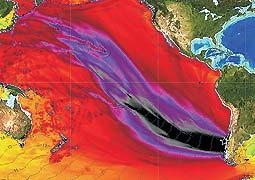Lives at risk from tsunami apathy
A public education campaign is urgently needed to inform Australians about the threats posed by tsunamis, UNSW experts say.
A public education campaign is urgently needed to inform Australians about the threats posed by tsunamis, UNSW experts say.

A public education campaign and more resources for emergency services are urgently needed to keep Australians safe from the threats posed by tsunamis, UNSW experts say.
The warning from the Australian Tsunami Research Centre at the University of New South Wales comes in the wake of the devastating Chilean earthquake and subsequent tsunami that swept across the Pacific Ocean on Sunday.
Australia's Tsunami Early Warning System worked well in the hours after the magnitude 8.8 quake, but public indifference to the threat put lives at risk, the Centre's Co-Directors Professor James Goff and Associate Professor Dale Dominey-Howes said.
"The warning system responded extremely well in terms of physical hardware and response by authorities," Dr Dominey-Howes said. "The warning issued was a Marine Warning - that is that unusual waves, currents and tides could affect the coast and that people should not be in the water. Yet at many beaches people continued to swim and surf."
The response was disappointing, Professor Goff said. "A tsunami warning is a very important public announcement - it is not made without a lot of careful consideration. Sadly, the public did not seem to agree."
Professor Goff said more needed to be done to educate the public.
"It is not the early warning system that is failing us, it is the last mile - education in schools, community awareness programs and tourist information. There are many ways to get the message across, but it needs to be in an integrated and effective manner," he said.
Professor Goff said two important steps must be taken: more research to better understand public behaviour and what people do and do not understand about warning messages; and more resources for the State Emergency Services to enhance community education and preparedness.
To see an animation of the tsunami's journey across the Pacific go to the website of the NOAA Centre for Tsunami Research.
Watch a UNSWTV interview with Professor Goff on how tribal folklore has helped indigenous peoples escape tsunamis.
Media contact: Professor James Goff | 02 9835 8431 | j.goff@unsw.edu.au